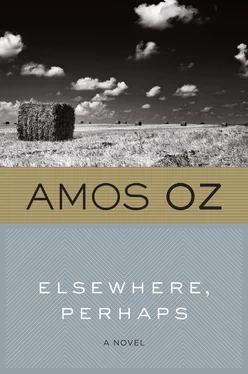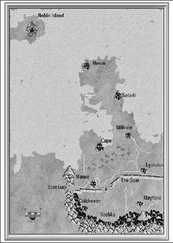Amos Oz - Elsewhere, Perhaps
Здесь есть возможность читать онлайн «Amos Oz - Elsewhere, Perhaps» весь текст электронной книги совершенно бесплатно (целиком полную версию без сокращений). В некоторых случаях можно слушать аудио, скачать через торрент в формате fb2 и присутствует краткое содержание. Год выпуска: 1985, Издательство: Mariner Books, Жанр: Современная проза, на английском языке. Описание произведения, (предисловие) а так же отзывы посетителей доступны на портале библиотеки ЛибКат.
- Название:Elsewhere, Perhaps
- Автор:
- Издательство:Mariner Books
- Жанр:
- Год:1985
- ISBN:нет данных
- Рейтинг книги:4 / 5. Голосов: 1
-
Избранное:Добавить в избранное
- Отзывы:
-
Ваша оценка:
- 80
- 1
- 2
- 3
- 4
- 5
Elsewhere, Perhaps: краткое содержание, описание и аннотация
Предлагаем к чтению аннотацию, описание, краткое содержание или предисловие (зависит от того, что написал сам автор книги «Elsewhere, Perhaps»). Если вы не нашли необходимую информацию о книге — напишите в комментариях, мы постараемся отыскать её.
Elsewhere, Perhaps — читать онлайн бесплатно полную книгу (весь текст) целиком
Ниже представлен текст книги, разбитый по страницам. Система сохранения места последней прочитанной страницы, позволяет с удобством читать онлайн бесплатно книгу «Elsewhere, Perhaps», без необходимости каждый раз заново искать на чём Вы остановились. Поставьте закладку, и сможете в любой момент перейти на страницу, на которой закончили чтение.
Интервал:
Закладка:
"Pardon?"
"I said did you want to tell me something?"
"Not at all, Daddy. I thought you had said something."
"No, I didn't say anything," Reuven replied, surprised.
"Strange," said Noga, without explaining the remark, and without explaining what she thought was strange.
In the evening everybody, young and old, crowds into the dining hall, dressed in light evening clothes. Einav, clearly pregnant, makes no effort to conceal her lameness. Tomer, her husband, lavishes signs of affection on her. Black hairs protrude from his ears, as from his father's. His tanned skin has the tone of dull copper.
At night the enemy soldiers fire nervously into the darkness. From time to time they light up the valley with colored flares. Even in the daytime they do not leave us alone. In the next sector, to the north of us, a man was shot and wounded in the shoulder while working in the orchard in broad daylight. We, too, have had an incident. One evening a stray shot was fired at Grisha Isarov as he was spreading the nets in one of the fish ponds by the border. The incident was not entirely unprovoked. Grisha Isarov had cultivated a strange habit of bawling Arabic curses in the direction of the enemy positions. Hardly an intelligent action. Grisha is not a child. We hope that in future he will restrain his marked love of adventure.
If Grisha, who is not a child, behaves so irresponsibly, is it any wonder that Gai Harish, who is a child, has introduced a distasteful game among his friends? They play at wars. All afternoon the kibbutz paths re-echo with their noisy games. Armed with stout sticks, they wreak havoc and carnage on the enemies of Israel under the orders of their young commander. Needless to say, many of us are critical of this innovation and are furious at the teachers who do not put a stop to it. Reuven does not know what to do. He does not believe in threats. He advocates patience. Grown-ups, he has a habit of saying, do not have a monopoly of making mistakes. In the course of these days, Reuven handed Bronka a photograph of his two children, for Bronka to send to her brother-in-law in Munich.
In fairness to little Gai it must be admitted that he and his friends do nothing more than make a great deal of noise. The case of Oren Geva (who refuses to be called Oren Berger) is much sadder. He and his gang of hooligans are always up to mischief. They appropriate property and damage it, wreck Herzl Goldring's meticulously kept flower beds and answer his protests with coarse sneers, break into the larders and make off with sweetmeats intended for the little children, start up tractors and roam with impunity all over the valley, throw vulgar looks at the girls of their own age, and even at older women, and bully their juniors. If you go out in the evening to take your clothes to the laundry, there they are holding a council round a small bonfire from which there wafts a smell of roasting flesh. If you come back around midnight from a film show in the dining hall, you can hear whispered conversations and unpleasant laughter in the bushes. In the middle of the afternoon you look up at the tall water tower and see a strangled cat hanging from the topmost railing by a length of truck driver's rope. The case of Oren and his gang has already been discussed in various committees. According to Herbert Segal, an ill wind is blowing from the towns and corrupting our youth. According to Bronka Berger, the roots of the trouble are psychological. Dirty books protrude from their pockets. They smell of stolen cigarettes. Around this time an extremely serious incident roused the kibbutz to an angry ferment. One morning Herzl discovered an empty land mine with Syrian markings in the shrubbery. It was supposed that Oren's gang had been out on a nocturnal foraging expedition in no man's land. It was a miracle that no disaster had ensued.
Bronka suffered agonies of shame and sorrow. Ezra Berger said nothing. When questioned, he shrugged his shoulders and smiled drily. Pressed to answer, he said:
"I'll punish the whole brood of vipers, including my own beloved younger son, as the saying goes."
Urged on to act, he remarked:
"Give him time. Some lame girl will get hold of him and turn him into a lamp stand. Time wounds all heels, as the wise man said."
There are thus a number of things that are not running quite smoothly. But if we overlook the exceptions and consider the general picture, we will see that our lives flow smoothly on in their orderly routine way toward the approaching festival of Shavuoth. In the morning the members go off to work as usual. At midday they return to the dining hall, which welcomes them with jugs of chilled lemonade. After a brief rest everyone goes out to the fields again to finish the day's work.
The working day ends at five o'clock. From every house comes the splash of shower water, mingled with sounds of singing. The smell of coffee wafts from the verandas, shaded with shrubs and climbing plants. The lawns are suddenly dotted with deck chairs and groups of people, lazily leafing through the morning paper or snatching forty winks. Some cultivate their gardens, watering, hoeing, weeding, and pruning. Others indulge in their favorite hobby or pastime — stamp collecting, coin collecting, photography, tennis, pet cats or dogs, an aquarium. Some do it alone; others include all the members of their families.
Herbert Segal, for example, walks up and down the concrete path with Reuven Harish. If you must know, they are discussing the latest trends in Israeli literature. Herbert is of the opinion that the young writers are blind. They are living at the height of a national, social, eschatological revolution that is unprecedented in history, and what do they see? Nothing. Storms in teacups. They have no positive message to offer, or even a negative one, for that matter. Reuven thinks he can explain this phenomenon.
"Very well then," says Herbert, "let's hear your explanation."
"It's a matter of optics. They are the pupil of the eye. And the pupil of the eye, biologists say, is blind."
Even everyday matters take on a new light at this time of day.
Isaac Friedrich, the treasurer, is sitting on a bench under a tree with Tsvi Ramigolski, the secretary. They are deep in complicated calculations. If you eavesdrop, you can catch references to compound interest, credit, contracts, guarantees. But both men look completely relaxed. Not because the financial problems do not affect them personally, but because they, too, are touched by the calm of the time and the place.
Later, somebody brings two or three copies of the evening paper. The livelier members get together to look at the headlines over each other's shoulders. The papers soon disintegrate, the pages passing peacefully from hand to hand. If an occasional discussion blows up, it never develops into a heated argument, because fundamentally we all share the same outlook on the world.
The heat gradually evaporates. The quavering notes of Herbert Segal's violin are answered by Herzl Goldring's accordion.
On the basketball court loud shouts break out. The Metsudat Ram team, top of the kibbutz teams in the valley, is playing a practice match. A small band of spectators huddles round the court. Each successful move is greeted by a burst of cheering. In between cheers the only sound is the silken padding of rubber soles on the concrete. Tomer Geva makes a slight movement with his hips. The opponent who has been set to mark him is taken in by the feint and misses Tomer's actual movement. A totally silent pass. Suddenly the ball is in Rami Rimon's hands. Rami does not hesitate for a split second. He sends the ball straight back to Tomer, who in the meantime has zigzagged like a snake through the defenders' lines. Tomer glances left to mislead his opponents, twists to the right, and, with a spectacular leap, puts the ball through the hoop. A grimace, which is not a smile, plays over his face and vanishes. His mouth is wide open. His face is streaming with sweat. Without a word, with a sharp wave of the arm, he collects his men and places them in readiness for the enemy attack. His team responds like musicians obeying the gentle wave of the conductor's baton. It is not words that count here. We are compelled to admit it. Not words. Here it is muscles and lungs and deadly cunning that win the day. Gleaming bodies weaving a narrow passage. Quick wits and powerful vitality. Razor-sharp reaction. That is what counts here. Perfect control of every sinew and fiber. We are not fond of this place. We are lovers of words. Our responses are too slow.
Читать дальшеИнтервал:
Закладка:
Похожие книги на «Elsewhere, Perhaps»
Представляем Вашему вниманию похожие книги на «Elsewhere, Perhaps» списком для выбора. Мы отобрали схожую по названию и смыслу литературу в надежде предоставить читателям больше вариантов отыскать новые, интересные, ещё непрочитанные произведения.
Обсуждение, отзывы о книге «Elsewhere, Perhaps» и просто собственные мнения читателей. Оставьте ваши комментарии, напишите, что Вы думаете о произведении, его смысле или главных героях. Укажите что конкретно понравилось, а что нет, и почему Вы так считаете.












